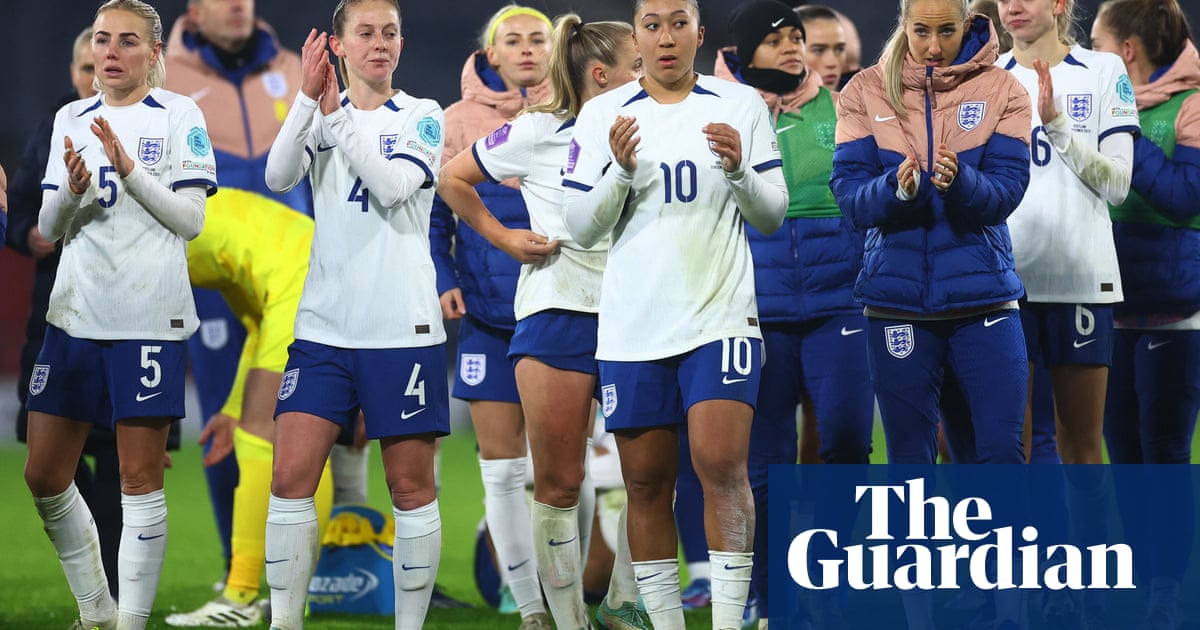
A campaign of huge regrets
How big a disaster is England’s failure to progress from their Nations League group, in turn ending hopes of Olympic qualification for Team GB? Very big. Sarina Wiegman’s Lionesses will likely reflect on this inaugural Nations League campaign with huge regrets; from the two poorly conceded goals on the counterattack in the 3-2 win over the Netherlands at Wembley and Lauren Hemp’s miss from a few yards in the 6-0 defeat of Scotland that was not enough to earn progression, to conceding late to suffer a 3-2 defeat by Belgium in the previous round of games or losing in the final minute against the Netherlands in Utrecht in September. “You think of ‘what ifs’ throughout the whole of your football career – that’s just the way football works,” the Chelsea full-back Niamh Charles said. “We know there’s going to be times where it’s gone in our favour and times when it’s not. I think dwelling on them you could go round and round in circles.” That is England’s task now, to avoid going round in circles on those what ifs and focus on how to make sure tournament fatigue does not prevent them from making a quick start in the Nations League next time.
Plenty of positives
Focusing on the positives of this camp and campaign will aid the mental recovery from a crushing exit, and there were plenty. It has taken time for England to find their rhythm in the Nations League but they ended on a high with the 6-0 defeat of Scotland. “If you don’t get through on goal difference then it’s just not enough,” Wiegman said. “Those are the facts. But I still think that what we’ve done with winning the Euros, getting to the final of a World Cup, having hardly any rest and going into our first Nations League campaign … yes, we’ve had moments where we were struggling a little bit and moments where we’ve played really well, but that’s football.”
Positives from the game against Scotland? Lauren James and Lucy Bronze. The former was electric against the team ranked 23rd in the world, scoring twice in two minutes and providing an assist seven minutes later. If James arrived on the international stage at the World Cup this year, she is cementing her value and showing increased consistency now. Bronze was the heart of England’s performance on Tuesday, driving forward at every opportunity, delivering news of the Netherlands score from the bench to the pitch and deserving of her late goal that almost, almost, earned progression, before the Dutch got a late fourth against Belgium. The right-back crumpled to the floor on hearing the news from Tilburg; she had given everything.
A summer off
There is a small silver lining in that England’s exhausted players now have a summer off. With the Tokyo Olympics and Euros pushed back a year, many of the Lionesses have played three back-to-back tournaments and had they ensured Team GB qualified for the Paris 2024 Games they would have extended the run without a break to five, with the Euros coming back around in 2025. Wiegman conceded they needed rest but also said that sacrificing a major tournament for that was not on the cards. “You want to go to every major tournament,” the manager said. “The career of a football player is [only] a certain amount of time, so if you can play every major tournament, of course every player wants that. In the bigger picture, we have to look at the calendar, and the players are not robots. And they need some rest too. That’s very obvious. But instead of a tournament? That goes a little bit too far, for me.”
Time to experiment and rebuild
What next for England? Wiegman now has time to experiment and rebuild the team for the Euros in Switzerland in 2025. In February they would have competed in the finals of the Nations League had they progressed, then started Olympic preparations. “We’ll go and play some friendlies,” said Wiegman of February’s camp. “That’s in progress and I haven’t spoken about that yet with our players. It’s not all set in stone, but we have plans ready to fill in.” Time to experiment is sorely needed. Having the Euros and World Cup in successive years left little time to rebuild and respond to turnover in the team. Too many fringe players have too few caps and are untested in the starting XI. That has proved costly, with players having to step in to replace injured teammates without having had their relationships tested in competitive or friendly matches. Instead, Wiegman has had to rely on club partnerships. Jess Carter was sometimes used alongside Millie Bright and, when she struggled against the Netherlands alongside Greenwood in the absence of Bright, Greenwood’s Manchester City teammate Esme Morgan was the player to come on in place of Carter and then started against Scotland.












